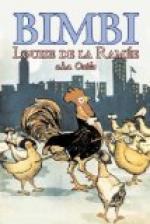At this farmhouse, with Martinswand towering above it, and Zell a mile beyond, there lived, and lives still, a little boy who bears the old historical name of Findelkind, whose father, Otto Korner, is the last of a sturdy race of yeomen, who had fought with Hofer and Haspinger, and had been free men always.
Findelkind came in the middle of seven other children, and was a pretty boy of nine years, with slenderer limbs and paler cheeks than his rosy brethren, and tender dreamy eyes that had the look, his mother told him, of seeking stars in midday: de chercher midi a quatorze heures, as the French have it. He was a good little lad, and seldom gave any trouble from disobedience, though he often gave it from forgetfulness. His father angrily complained that he was always in the clouds,—that is, he was always dreaming, and so very often would spill the milk out of the pails, chop his own fingers instead of the wood, and stay watching the swallows when he was sent to draw water. His brothers and sisters were always making fun of him: they were sturdier, ruddier, and merrier children than he was, loved romping and climbing and nutting, thrashing the walnut trees and sliding down snowdrifts, and got into mischief of a more common and childish sort than Findelkind’s freaks of fancy. For indeed he was a very fanciful little boy: everything around had tongues for him; and he would sit for hours among the long rushes on the river’s edge, trying to imagine what the wild green-gray water had found in its wanderings, and asking the water rats and the ducks to tell him about it; but both rats and ducks were too busy to attend to an idle little boy, and never spoke, which vexed him.




